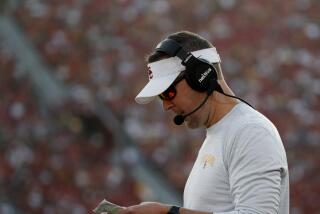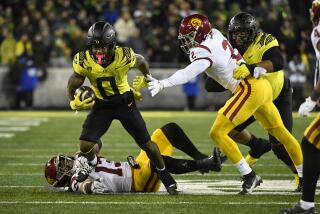Pac-12 football coaches hush-hush about hurt players
Picture this: As the USC football team finishes its morning practice a few days before the UCLA game, quarterback Matt Barkley rolls right and twists his knee, falling in a heap.
Trainers rush to his side, waving for a cart to transport him to the locker room.
A dozen reporters watch from the sideline but, according to strict new policies at USC, they must pretend it never happened.
Welcome to the Pac-12 Conference’s version of the post-Information Age, where coaches across this traditionally open and accessible conference are treating injuries like a national secret.
From Seattle to Westwood, they have stopped talking about players who get hurt and threatened to ban reporters who disclose injuries suffered in practice.
“That would be completely from a competitive advantage-disadvantage perspective,” USC Coach Lane Kiffin said. “I don’t think any coach would want their opponents to know, as they game-plan throughout the week, who is going to play and who is not.”
Unlike the NFL, which requires teams to post weekly injury reports, the NCAA has no standing policy. College programs can release — or withhold — information as they see fit.
Some coaches understand that doesn’t always satisfy fans who have grown hungry for constant updates on the Internet.
“We want to give our fans as much opportunity to have as much knowledge of our football team heading into every Saturday as we can give them,” Washington Coach Steve Sarkisian said.
But in balancing full disclosure against the desire to win, Sarkisian has joined with conference rivals who either close practices or restrict what the media can report.
“I feel like I owe it to our team not to put them at a competitive disadvantage,” he said.
For many years, West Coast football stood apart from a more guarded mentality in the Midwest and South. Now, the differences are fading.
Some schools to the east are opening up. During conference play, the Atlantic Coast Conference posts a weekly injury report that lists players under categories such as “probable,” “questionable” and “out.”
Even coaches such as Nick Saban at Alabama and Brian Kelly at Notre Dame, both of whom keep tight reins on their programs, regularly discuss injuries with reporters.
In the Pac-12, more and more coaches are falling in line with Chip Kelly of Oregon, who bars media from practice and almost never mentions injuries, even when a player is missing from play for weeks on end.
“It can become contagious,” said Steve Richardson, executive director of the Football Writers Assn. of America. “We see one coach stop talking and then other coaches in the conference do the same thing.”
That’s what happened to Sarkisian, who was an assistant at USC during the wide-open Pete Carroll days but tightened his policy at Washington last week.
“What really forced me to do this, as we were getting ready to play Pac-12 Conference play … our first three opponents don’t report injuries,” he said. “I just felt like, from a competitive standpoint, why should we?”
Opinions differ on the value of such information.
Rich Rodriguez began issuing injury reports at Michigan and has continued the practice in his first year at Arizona. In many cases, Rodriguez believes he can avoid the headache of answering questions all week without giving too much away.
“If you don’t know for sure if a guy’s going to play or not, you’re just going to put ‘doubtful’ or ‘questionable,’” he said. “That doesn’t tell the other team whether he’s going to play or not.”
At Oregon State, Coach Mike Riley has the most liberal policy in the conference, opening his practice to the public. But he also assigns a graduate assistant to monitor Pac-12 injury reports, knowing he can attack a spot where an opposing player is hurt or has given way to a reserve.
Other Pac-12 coaches said they avoid discussing injuries for privacy reasons.
Stanford Coach David Shaw said, “These are not professional athletes, they are amateur athletes and their health is not anybody else’s concern.” Washington State Coach Mike Leach characterized injury news as “journalism at its most pitiful level.”
“There are two types of journalists,” he said, proceeding to list three. “There’s the guy that wants to write the great American novel. And then there’s the type that wants to do a good, solid job, has some creativity. And then there’s the type that are just slackers — they’re the ones who are really interested in injuries.
“And the reason they’re really interested in injuries is because they’re not creative enough to keep their stories interesting,” he said.
Like other coaches, Leach said that federal privacy laws restrict him from discussing injuries. But it isn’t that simple.
A coach and his university can be held liable for disclosing health information only if they have not previously obtained the student’s permission.
“It would be the school’s choice,” said Ryan Abbott, an associate professor at Southwestern Law School. “They can have students sign a waiver, and many schools do that.”
On a practical basis, trying to restrict the media can be equally tricky, as USC recently learned.
Earlier this month, the team barred a Daily News reporter from practice for two weeks and refused to issue him a credential for Saturday’s game against California because he reported that Trojans kicker Andre Heidari had undergone knee surgery.
It turned out the reporter had not violated policy because he learned of Heidari’s surgery outside of practice. USC subsequently reinstated him and agreed to speak with local newspaper editors about adjusting the team’s policy.
No changes have yet been announced.
Last week, with the issue heating up, Pac-12 Commissioner Larry Scott suggested it might be time for a change.
When the conference’s athletic directors gather for a meeting in October, Scott wants them to consider a weekly report similar to what the NFL provides.
At UCLA, first-year Coach Jim Mora would rather stay mum but thinks that Scott’s suggestion might be viable.
“If it is across the board, and everyone is held to the same standard, then I don’t have any problem with it at all,” he said. “It works in the NFL.”
The writers association would support a standard that provides some degree of disclosure, Richardson said. Of course, everyone understands that weekly reports are no cure-all.
In the NFL, teams are not always entirely truthful. And Kiffin believes that fans, though hungry for information, don’t necessarily want to know everything.
“The most important thing they want is for their team … to have a competitive advantage,” he said. “I think fans would understand that completely.”
twitter.com/LATimesWharton
Times staff writer Chris Foster contributed to this report.
More to Read
Go beyond the scoreboard
Get the latest on L.A.'s teams in the daily Sports Report newsletter.
You may occasionally receive promotional content from the Los Angeles Times.







